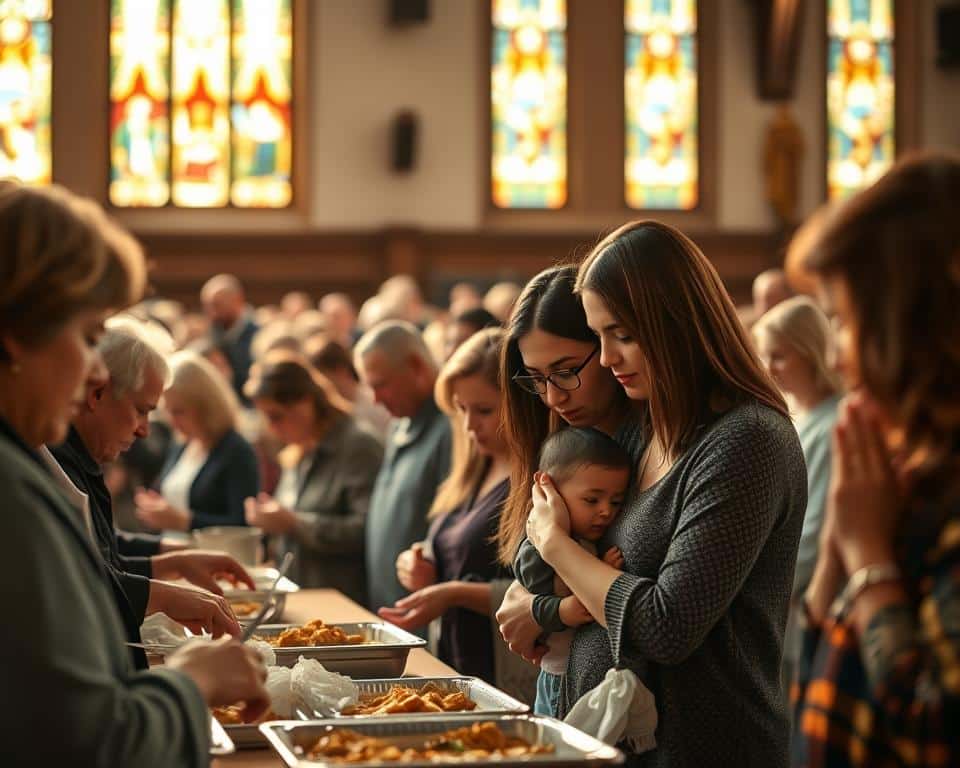Mother Teresa once said, “Not all of us can do great things. But we can do small things with great love.” These words capture the heart of service—a tangible expression of faith in motion. When we step out to help others, we live out the truth found in Scripture.
In the U.S., 32% of volunteers serve through religious organizations. This shows how deeply faith inspires action. Jesus’ words in Matthew 25:35-40 remind us that caring for others is like serving Him directly.
Yet, many faith-based groups struggle to keep volunteers long-term. The challenge isn’t just commitment—it’s seeing service as a spiritual discipline, not just a duty. True giving flows from love, not obligation.
When we serve, we mirror God’s love in practical ways. It’s faith made visible, one act of kindness at a time.
Faith-Driven Volunteering as a Spiritual Practice
James 2:17 reminds us that faith without works is incomplete. True belief moves us to act—feeding the hungry, comforting the lonely, and lifting the broken. This is where faith traditions meet hands-on love.
Aligning Service with Religious Teachings
Scripture is clear: “If a brother or sister is poorly clothed and lacking daily food, and one of you says to them, ‘Go in peace,’ without giving what they need, what good is that?” (James 2:15-16). Our Father’s House Soup Kitchen lives this truth, serving over 900,000 meals since 1993.
Unlike transactional volunteering, faith-rooted service sees every meal as an offering. It’s not just about filling stomachs—it’s about honoring God’s call in Matthew 25:40: “Truly, I say to you, as you did it to one of the least of these, you did it to me.”

Volunteering as an Act of Devotion
The Salvation Army exemplifies this. Their disaster relief programs pair emergency aid with prayer. A blanket becomes a blessing. A meal becomes a moment of hope.
Consistency matters. Showing up weekly at a food bank or tutoring program isn’t just charity—it’s worship. Religious teachings urge us to serve with others, not just for them. That’s how communities grow stronger.
When we view serving others as devotion, even small acts carry eternal weight. A smile, a listening ear, or a hot meal can be sacred.
The Role of Faith-Based Organizations in Volunteerism
From food pantries to legal aid, faith-based groups bridge gaps with compassion. These organizations transform Scripture’s call to love into tangible programs that uplift communities. Their structured efforts ensure no act of service stands alone—each is part of a larger mission.

Structured Programs for Community Impact
The Meraki Group exemplifies this through workshops that equip faith communities with legal and social tools. Their model pairs doctrinal clarity with practical training, ensuring volunteers serve with both skill and conviction.
Similarly, Best Skills Best Churches trains leaders to manage outreach programs effectively. By focusing on stewardship and teamwork, they turn churches into hubs of hope. Clear alignment with Biblical values strengthens recruitment and retention.
Building Connections Through Shared Beliefs
Church food pantries often become neighborhood anchors. A shared meal can spark conversations, weaving bonds stronger than hunger. These spaces reflect James 2:16’s charge to meet needs with more than words.
Shared worship spaces also amplify impact. When congregations collaborate, resources multiply. A single building might host tutoring, counseling, and meals—all rooted in shared faith. Here, service becomes a testament to unity in Christ.
Personal Growth Through Faith-Based Service
Serving others isn’t just about giving—it’s about growing. When we align our actions with God’s word, we discover a sense purpose that transforms our hearts. Studies show 72% of faith volunteers report higher life satisfaction—proof that compassion rewards the giver as much as the receiver.
Developing Humility and Empathy
Philippians 2:3-4 urges us: “Do nothing out of selfish ambition. Value others above yourselves.” Serving at a homeless shelter or tutoring program teaches this firsthand. One long-term volunteer shared, “I came to help, but I left realizing how much I needed to learn.”
Global Commission Partners’ mentorship programs reveal how many volunteers gain humility. By listening to others’ struggles, they see their own blessings clearly. Empathy grows when we step into someone else’s shoes.
Finding Purpose in Helping Others
Scripture ties purpose to action. James 1:27 links pure faith to caring for those in need. A food bank director noted, “Volunteers often find their sense purpose deepens as they serve consistently.”
Practical steps to sustain compassionate service:
- Start small: Commit to weekly volunteer work at a local church pantry.
- Reflect often: Journal how service changes your perspective.
- Connect spiritually: Pray for those you serve—it anchors compassion in faith.
Strengthening Communities with Faith-Driven Efforts
When faith communities unite, neighborhoods transform—one act of love at a time. From disaster relief to food banks, shared beliefs fuel solutions that address local needs. Romans 12:4-5 reminds us: “For as in one body we have many members, and the members do not all have the same function, so we, though many, are one body in Christ.” This truth inspires collective action.
Compassion in Action: Addressing Local Needs
In Puerto Rico, the Alliance for Third Sector’s interfaith teams rebuilt homes after hurricanes. Churches, mosques, and synagogues worked side by side. Their impact? Over 200 families housed—proof that faith thrives in service.
Arizona State University’s research shows such projects reduce neighborhood conflicts by 40%. Shared meals at interfaith food banks also foster deeper understanding. As one volunteer noted: “Breaking bread together breaks down walls.”
Interfaith Volunteering for Unity
Training matters. Programs like “Faith in Action” teach cultural sensitivity. Volunteers learn to serve across differences, honoring each person’s dignity. Key steps include:
- Listen first: Understand community needs before acting.
- Partner widely: Unite congregations for larger impact.
- Celebrate diversity: Let service reflect God’s love for all.
When faith communities collaborate, hope becomes tangible. A meal packed by many hands feeds more than bodies—it nourishes souls.
Overcoming Challenges in Faith-Driven Volunteering
Even the most dedicated volunteers face obstacles when answering God’s call to serve. While 58% struggle with time management, Scripture provides timeless wisdom to navigate these hurdles. True service flows from faith, not fatigue—and God equips those He calls.
Managing Burnout with Spiritual Resilience
The Meraki Group’s annual retreat model shows how rest renews purpose. Volunteers spend three days in prayer, reflecting on Exodus 18:13-24—where Moses learned delegation avoids exhaustion. Their schedule includes:
- Morning devotionals anchored in Psalm 23: “He restores my soul”
- Small group discussions on setting healthy boundaries
- Silent reflection time to reconnect with God’s calling
As one participant shared: “Returning to the ‘why’ behind our work prevents burnout.”
Balancing Service and Personal Commitments
Church leaders often juggle multiple activities. Time-blocking helps: dedicate two weekly hours solely to volunteer coordination, as Nehemiah did when rebuilding Jerusalem’s walls (Nehemiah 4:6). Other practical steps:
- Prayer journaling to align daily tasks with God’s priorities
- Sabbath rest as commanded in Exodus 20:8-10—service shouldn’t replace worship
- Team delegation following Jesus’ model (Luke 10:1)
Remember: Sustainable service honors both the giver and the Receiver of all good works.
Practical Steps to Start Faith-Driven Volunteering
Scripture calls us to action, but how do we begin serving with intention? Whether you’re new to service or seeking deeper alignment with God’s word, these steps will guide your journey. True service starts with purpose—matching your gifts to needs that reflect your beliefs.
Identifying Causes Aligned with Your Beliefs
Before committing, ask:
- Does this mission reflect Biblical values? (e.g., Matthew 25:35–40)
- Are my skills a good fit? Teaching, cooking, or organizing can all serve.
- Is the organization’s doctrine clear? Review their statements of faith.
“Each of you should use whatever gift you have received to serve others.”
Engaging with Local Faith-Based Groups
The Salvation Army’s programs offer a proven model. Their onboarding includes:
- Orientation modules covering mission and safety.
- Mentorship from experienced volunteers.
For church-based roles, contact coordinators directly. Bring:
- A resume (for skill-based roles).
- References if required.
When we serve through faith-based organizations, we join a legacy of hope. Start small, pray for guidance, and let God’s love lead.
The Lasting Impact of Faith in Service
Every act of service rooted in God’s word plants seeds of eternal change. Studies show faith-based volunteers stay 65% longer than secular ones—proof that love anchored in truth endures.
2 Corinthians 9:12-13 reminds us: “This service glorifies God and meets others’ needs.” From food pantries to disaster relief, faith leaves a legacy. Revelation 14:13 promises our labor in Christ is never forgotten.
Start small. A weekly meal or prayer can bless others deeply. Let’s pray: “Lord, guide us to serve where You’re already working.” Together, we’ll see faith’s impact grow.





